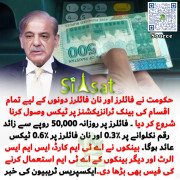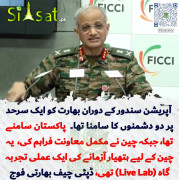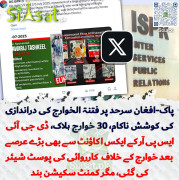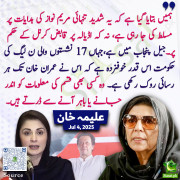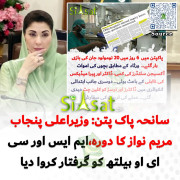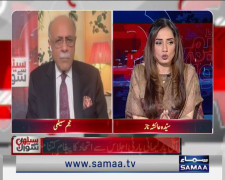UKPakistani
Chief Minister (5k+ posts)
As Pakistan Faces 2 Crises, Military Denies a Conspiracy

ISLAMABAD, Pakistan — Pakistan lurched between crises on Friday with its military chief, Gen. Ashfaq Parvez Kayani, dismissing talk of a coup and canceling a visit from a top American general, a sign that Pakistani fury at the United States over airstrikes that killed 26 soldiers is far from abating. Enlarge This Image
“The army will continue to support democratic process in the country,” Gen. Ashfaq Parvez Kayani was quoted as saying in a statement issued by the military command.
Concern has been growing in Pakistan and abroad that the two crises — a political struggle that has pitted civilian officials against the military, and the fraying relations with the United States — are distracting from deeper threats to stability, primarily the faltering economy and the festering Islamist insurgency. The Pakistani Taliban offered a sharp reminder of their potency on Friday, killing one soldier and abducting 15 in an attack on a paramilitary post in the country’s northwest, the police said. The Taliban militants threatened to kill the captives. But the focus in Pakistan on Friday was talk of a military coup. The rumors were set off a day earlier when the prime minister, Yousaf Raza Gilani, warned publicly of a conspiracy to topple the government. He was careful not to openly accuse the military of plotting a takeover, but he did say that it must answer to the elected government and could not operate as a “state within a state.”
It takes very little to stoke rumors of a coup in Pakistan, where the military has ruled for more than half of the country’s history. Even now, nearly four years after the restoration of democracy, the military remains Pakistan’s dominant institution, and it largely dictates foreign policy and national security matters.
But the military has made no apparent moves to assert control over the government, despite the widespread perception among its ranks and the broader population that Pakistan’s squabbling political elite is incapable of taking on the country’s challenges. Most analysts and Western officials have concluded that General Kayani remains committed to democracy, for now, as long as the military retains its behind-the-scenes power.
“The army will continue to support democratic process in the country,” General Kayani said in remarks to troops stationed in the northwestern tribal areas where the army is struggling to contain the Pakistan Taliban, an offshoot of the Afghan insurgent movement, according to a military statement released Friday.
The statement said that General Kayani, on a visit on Thursday, told the soldiers that talk of a coup was being “used as a bogey to divert the focus from the real issues.” But, he emphasized, there would be “no compromise on national security.”
The military did not elaborate on what General Kayani meant. But his remarks were seen as a reference to allegations that Pakistan’s ambassador to the United States, backed by the elected government, had sought Washington’s help in heading off a coup and asserting civilian control over the military in the wake of the American raid that killed Osama bin Laden in May. The allegations are particularly inflammatory because many Pakistanis see the United States as an enemy, despite the nations’ long-standing alliance.
A Pakistani-American businessman, Mansoor Ijaz, has claimed that Husain Haqqani, then the ambassador, wrote a memo containing the appeal and asked Mr. Ijaz to convey it to Adm. Mike Mullen, who was then the chairman of the Joint Chiefs of Staff. Mr. Haqqani has denied writing the memo, and the civilian government has backed him. But he was forced to resign, and his passport was confiscated upon his return to Pakistan in late November.
Suspicion has since spread to President Asif Ali Zardari, who this month had admitted himself to a hospital in Dubai, in the United Arab Emirates, complaining of chest pains. His sudden departure helped to incite the latest round of coup rumors, though he has since returned, and he began working again on Friday.
The military has signaled that it believes the memo was the work of Mr. Haqqani, and possibly the president. It has urged the Supreme Court open an inquiry, a decision the justices are weighing.
Ikram Sehgal, a defense analyst and former army officer, said that Mr. Gilani’s statement on Thursday had “strengthened the military’s conviction” that the government was behind the memo. He warned that any attempt by the elected government to remove General Kayani would lead to a mutiny by the military’s rank and file, who have little faith in civilian authorities.
“Things don’t look stable at all,” Enver Baig, a former senator from the governing Pakistan Peoples Party, said in an interview on Friday.
But in one positive sign for the government, Chief Justice Iftikhar Muhammad Chaudhry said Friday that he would not validate a military coup. Past military rulers have gotten the court to endorse their takeovers.
Relations with the United States, meanwhile, appeared to sour further. Pakistan’s military, at the order of General Kayani, canceled a meeting with the chief of the United States Central Command, Gen. James N. Mattis, a senior Pakistani official said. The meeting, to have been held Monday, had been called to explain the findings of the American investigation into the November airstrikes that killed 26 Pakistani soldiers at posts on the Afghan border, said the official, who asked not to be identified because the meeting had not been previously announced.
The Pentagon on Thursday acknowledged mistakes before and during the airstrikes. But it also said that the Pakistanis had erred. Pakistan’s military responded by calling the investigation “short on facts.”
http://www.nytimes.com/2011/12/24/w...-rumors-denies-conspiracy-to-seize-power.html

ISLAMABAD, Pakistan — Pakistan lurched between crises on Friday with its military chief, Gen. Ashfaq Parvez Kayani, dismissing talk of a coup and canceling a visit from a top American general, a sign that Pakistani fury at the United States over airstrikes that killed 26 soldiers is far from abating. Enlarge This Image
“The army will continue to support democratic process in the country,” Gen. Ashfaq Parvez Kayani was quoted as saying in a statement issued by the military command.
Concern has been growing in Pakistan and abroad that the two crises — a political struggle that has pitted civilian officials against the military, and the fraying relations with the United States — are distracting from deeper threats to stability, primarily the faltering economy and the festering Islamist insurgency. The Pakistani Taliban offered a sharp reminder of their potency on Friday, killing one soldier and abducting 15 in an attack on a paramilitary post in the country’s northwest, the police said. The Taliban militants threatened to kill the captives. But the focus in Pakistan on Friday was talk of a military coup. The rumors were set off a day earlier when the prime minister, Yousaf Raza Gilani, warned publicly of a conspiracy to topple the government. He was careful not to openly accuse the military of plotting a takeover, but he did say that it must answer to the elected government and could not operate as a “state within a state.”
It takes very little to stoke rumors of a coup in Pakistan, where the military has ruled for more than half of the country’s history. Even now, nearly four years after the restoration of democracy, the military remains Pakistan’s dominant institution, and it largely dictates foreign policy and national security matters.
But the military has made no apparent moves to assert control over the government, despite the widespread perception among its ranks and the broader population that Pakistan’s squabbling political elite is incapable of taking on the country’s challenges. Most analysts and Western officials have concluded that General Kayani remains committed to democracy, for now, as long as the military retains its behind-the-scenes power.
“The army will continue to support democratic process in the country,” General Kayani said in remarks to troops stationed in the northwestern tribal areas where the army is struggling to contain the Pakistan Taliban, an offshoot of the Afghan insurgent movement, according to a military statement released Friday.
The statement said that General Kayani, on a visit on Thursday, told the soldiers that talk of a coup was being “used as a bogey to divert the focus from the real issues.” But, he emphasized, there would be “no compromise on national security.”
The military did not elaborate on what General Kayani meant. But his remarks were seen as a reference to allegations that Pakistan’s ambassador to the United States, backed by the elected government, had sought Washington’s help in heading off a coup and asserting civilian control over the military in the wake of the American raid that killed Osama bin Laden in May. The allegations are particularly inflammatory because many Pakistanis see the United States as an enemy, despite the nations’ long-standing alliance.
A Pakistani-American businessman, Mansoor Ijaz, has claimed that Husain Haqqani, then the ambassador, wrote a memo containing the appeal and asked Mr. Ijaz to convey it to Adm. Mike Mullen, who was then the chairman of the Joint Chiefs of Staff. Mr. Haqqani has denied writing the memo, and the civilian government has backed him. But he was forced to resign, and his passport was confiscated upon his return to Pakistan in late November.
Suspicion has since spread to President Asif Ali Zardari, who this month had admitted himself to a hospital in Dubai, in the United Arab Emirates, complaining of chest pains. His sudden departure helped to incite the latest round of coup rumors, though he has since returned, and he began working again on Friday.
The military has signaled that it believes the memo was the work of Mr. Haqqani, and possibly the president. It has urged the Supreme Court open an inquiry, a decision the justices are weighing.
Ikram Sehgal, a defense analyst and former army officer, said that Mr. Gilani’s statement on Thursday had “strengthened the military’s conviction” that the government was behind the memo. He warned that any attempt by the elected government to remove General Kayani would lead to a mutiny by the military’s rank and file, who have little faith in civilian authorities.
“Things don’t look stable at all,” Enver Baig, a former senator from the governing Pakistan Peoples Party, said in an interview on Friday.
But in one positive sign for the government, Chief Justice Iftikhar Muhammad Chaudhry said Friday that he would not validate a military coup. Past military rulers have gotten the court to endorse their takeovers.
Relations with the United States, meanwhile, appeared to sour further. Pakistan’s military, at the order of General Kayani, canceled a meeting with the chief of the United States Central Command, Gen. James N. Mattis, a senior Pakistani official said. The meeting, to have been held Monday, had been called to explain the findings of the American investigation into the November airstrikes that killed 26 Pakistani soldiers at posts on the Afghan border, said the official, who asked not to be identified because the meeting had not been previously announced.
The Pentagon on Thursday acknowledged mistakes before and during the airstrikes. But it also said that the Pakistanis had erred. Pakistan’s military responded by calling the investigation “short on facts.”
http://www.nytimes.com/2011/12/24/w...-rumors-denies-conspiracy-to-seize-power.html
Last edited:







